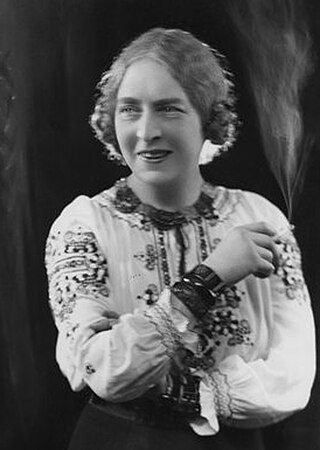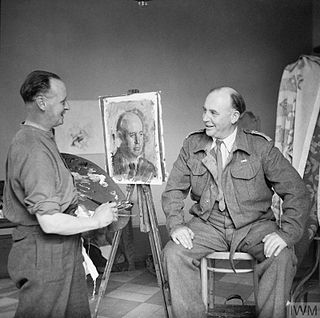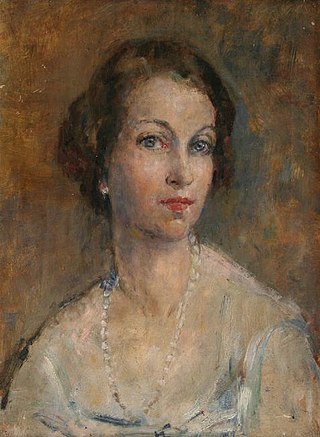Related Research Articles

Sophie Gengembre Anderson was a French-born British Victorian painter who was also active in America for extended periods. She specialised in genre paintings of children and women, typically in rural settings. She began her career as a lithographer and painter of portraits, collaborating with Walter Anderson on portraits of American Episcopal bishops. Her work, Elaine, was the first public collection purchase of a woman artist. Her painting No Walk Today was purchased for more than £1 million.

Dame Laura Knight was an English artist who worked in oils, watercolours, etching, engraving and drypoint. Knight was a painter in the figurative, realist tradition, who embraced English Impressionism. In her long career, Knight was among the most successful and popular painters in Britain. Her success in the male-dominated British art establishment paved the way for greater status and recognition for female artists.

Philip Wilson Steer was a British painter of landscapes, seascapes plus portraits and figure studies. He was also an influential art teacher. His sea and landscape paintings made him a leading figure in the Impressionist movement in Britain but in time he turned to a more traditional English style, clearly influenced by both John Constable and J. M. W. Turner, and spent more time painting in the countryside rather than on the coast. As a painting tutor at the Slade School of Art for many years he influenced generations of young artists.

Lucy Elizabeth Kemp-Welch was a British artist and teacher who specialized in painting horses. Though increasingly overlooked after the Second World War, from the late 1890s to the mid-1920s she was one of the country's best-known female artists. As her obituary in The Times noted, 'Like most artists who came to maturity and were established before the end of the nineteenth century, Lucy Kemp-Welch suffered somewhat in her later reputation from the violent changes in art which followed. In her prime as an animal painter she held a position in this country comparable to that of Rosa Bonheur in France, and the only British woman artist of her generation who was more talked about was Lady Elizabeth Butler, painter of "The Roll Call".' Her reputation has since revived, and she is best known today for her large paintings of wild and working horses in the New Forest, and those in military service which she produced during the First World War, as well as for her illustrations to the 1915 edition of Anna Sewell's novel Black Beauty.

Alfred Edward Emslie was a British genre and portrait painter, and photographer, living at The Studio, 34, Finchley Road, N. W.

Margaret Sarah Carpenter was an English painter. Noted in her time, she mostly painted portraits in the manner of Sir Thomas Lawrence. She was a close friend of Richard Parkes Bonington.

Henry Marvell Carr,, was a successful British landscape and portrait painter who served as a war artist during World War II.
Rupert Norman Shephard was an English painter, illustrator and art teacher.

Sydney William Carline was a British artist and teacher known for his depictions of aerial combat painted during World War One.
Blanche Jenkins was a British portrait painter.
Louise Pickard was an English painter of still life, landscapes and portraits.
Margaret Backhouse (1818–1888) was a successful British portrait and genre painter during the 19th century. Although she was born near Birmingham, Backhouse spent most of her life in London where she showed works on a regular basis at the Royal Academy, the Society of Women Artists and at the Royal Society of British Artists.
Thomas Cantrell Dugdale was a British artist. He was a member of the Royal Academy, was a renowned portrait painter and served as a war artist in both World War One and World War Two.
Eleanor Mary Hughes, was a New Zealand landscape artist who mostly painted in watercolours. She settled and worked in Britain and became an active member of the Newlyn School of artists and the nearby Lamorna artists colony.
Florence Ada Engelbach née Neumegen was a painter of portraits, landscapes and flower pieces. She was born in Spain to English parents and, after training in London, established her artistic career in Britain.

Mary Augusta McEvoy née Spencer Edwards was a British artist known for her paintings of portraits, interiors and flowers.
Rosa Gwenny Griffiths was a Welsh artist known for her portrait and flower paintings.
Janet Archer was a British artist known for her portrait and genre paintings.

Mary Black was an English artist known for her portrait paintings.
Mary Henrietta Dering Curtois, known professionally as Dering Curtois (1854–1928), was a British artist, known for painting genre scenes, landscapes and portraits.
References
- 1 2 3 4 5 6 7 H. C. G. Matthew; Brian Harrison, eds. (2004). Oxford Dictionary of National Biography Vol 3 (Avranches-Barnewall). Oxford University Press. ISBN 0-19-861353-9.
- ↑ Christopher Wood (1978). The Dictionary of Victorian Painters . Antique Collectors' Club. ISBN 0-902028-72-3.
- ↑ Brian Stewart; Mervyn Cutten (1997). The Dictionary of Portrait Painters in Britain up to 1920. Antique Collectors' Club. ISBN 1-85149-173-2.
- ↑ Benezit Dictionary of Artists Volume 1 A-Bedeschini. Paris: Editions Grund. 2006. ISBN 2-7000-3070-2.
- ↑ Harry Turnbull (1976). Artists of Yorkshire: A Short Dictionary (artists Born Before 1921). Thornton Gallery. ISBN 978-0-9505341-0-7.